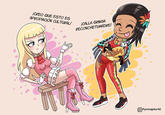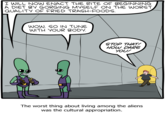Cultural Appropriation
Part of a series on Social Justice Blogging. [View Related Entries]
[View Related Sub-entries]
About
"Cultural Appropriation" refers to the practice of adopting various aspects of a minority culture by individuals belonging to a dominant cultural group, including iconography, music, language and social behavior. The practice is often portrayed in a negative light by those who view it as exploitative or culturally insensitive. Others have rejected the charge that it is harmful, claiming that cultural imitation is unavoidable and is often done out of admiration with no intent to harm.
Origin
The exact origin of the term "cultural appropriation" is unknown, although the concept appears to have been predominately used in academic circles in sociology and anthropology prior to the Internet. On September 9th, 2003, the book Everything But the Burden: What White People Are Taking from Black Culture[9] by Greg Tate was released. On November 12th, 2004, the pop song "Harajuku Girls" by Gwen Stefani was released with her debut album Love. Angel. Music. Baby. (shown below). On October 31st, 2005, comedian Margaret Cho published a blog post expressing misgivings with the song for promoting racial stereotypes.
On June 8th, 2005, the book Who Owns Culture?: Appropriation and Authenticity in American Law[1] by American lawyer Susan Scafidi was released. In May 2006, the annual feminist science fiction convention WisCon held a panel on cultural appropriation. The panel was subsequently met with criticism online, with several Livejournal users creating lengthy posts about the subject.[4][5][6][7][8]
Spread
On January 15th, 2009, the political blog The Angry Black Woman[10] published an article about cultural appropriation, which cited heated debates sparked by previous panels at WisCon. On April 29th, the Tumblr[3] blog "My Culture is Not a Trend," was launched, which highlights examples of perceived cultural appropriation on the Internet. On January 15th, 2010, the blog Native Appropriations[8] was launched as "a forum for discussing representations of Native peoples." On November 4th, 2012, the Tumblr blog "Cultural Appropriation on Tumblr"[9] was launched.
Selena Gomez Bindi Controversy
On April 14th, 2013, singer Selena Gomez delivered a live performance of her single "Come and Get It" while wearing an Indian-themed outfit and bindi on her forehead, which lead The Universal Society of Hinduism to demand an apology from the pop star (shown below).
Harlem Shake
On March 4th, The Huffington Post[12] published an article questioning whether the "Harlem Shake" meme could be considered an example of cultural appropriation.
Katy Perry "Unconditionally" Controversy
On November 24th, singer-songwriter Katy Perry received condemnation for performing her single "Unconditionally" while dressed as a Japanese geisha (shown below).
Avril Lavigne "Hello Kitty" Video
On April 23rd, 2014, the music video for the song "Hello Kitty" by Avril Lavigne was released, which drew criticism for scenes featuring the pop star eating Japanese foods and dancing in front of backup dancers wearing Hello Kitty costumes (shown below).
Spanish Speakers
On May 25th, Redditor asgardian-princess submitted a screenshot of a Tumblr post accusing non-native Spanish speakers who speak the language as being guilty of cultural appropriation to the /r/TumblrInAction[14] subreddit, where it garnered upwards of 3,900 votes (97% upvoted) and 670 comments prior to being archived.

"Dear White Gays: Stop Stealing Black Female Culture"
On July 9th, Time[11] published an op-ed titled "Dear White Gays: Stop Stealing Black Female Culture," which denounced white gay men who emulate the social behavior of black women.
Shake it Off
On August 18th, the music video for the pop song "Shake it Off" by Taylor Swift was released on YouTube, which drew criticism for its portrayal of Swift crawling around women performing a twerk dance (shown below).
"Innovative Crackers"
On December 20th, Reddit _I_Have_No_Mouth submitted a screenshot of a Tumblr post complaining about "cultural dishes getting butchered by 'innovative' crackers" to the /r/TumblrInAction[13] subreddit, where it gained over 4,700 votes (96% upvoted) and 480 comments in the first month.
Iggy Azaela
On December 29th, The Daily Beast[15] published an article accusing rapper Iggy Azalea of appropriating black culture.

Moana Costume Controversy
On September 18th, 2016, backlash spread against a Halloween costume Disney was selling of Maui, a Polynesian character from their upcoming film, Moana.[16] The costume, shown below, was a brown bodysuit covered in tattoos with a leaf skirt. It drew accusations of "brownfacing," inviting kids to dress up in a different skin color.

On September 21st, Disney removed the costume from their online stores following the slew of complaints.[17] In a statement, they said:
"“The team behind Moana has taken great care to respect the cultures of the Pacific Islands that inspired the film, and we regret that the Maui costume has offended some. We sincerely apologize and are pulling the costume from our website and stores.”
Criticism
On July 15th, The Daily Beast[12] published an article titled "You Can't 'Steal' a Culture: In Defense of Cultural Appropriation," asserting that "the concept of cultural appropriation has morphed into a parody of the original idea." On July 17th, YouTuber the1janitor uploaded a video arguing that online cultural appropriation shaming has been "taken to a ridiculous level" (shown below).
On August 5th, The Daily Dot[11] published an article titled "5 Things White People Need to Learn About Cultural Appropriation."
Related Memes
We're a Culture, Not a Costume
We’re a Culture, Not a Costume is a poster ad campaign that features students of various ethnicities holding photos of people dressed in Halloween costumes that could be perceived as culturally insensitive. The campaign inspired a series of photoshop parodies depicting animals and fictional characters with photos of people wearing their respective Halloween costumes.

Search Interest
External References
[1] Amazon – Who Owns Culture?
[2] Irosf – Appropriate Cultural Appropriation
[3] Tumblr – My Culture is Not a Trend
[4] Livejournal – rilina (post deleted)
[5] Livejournal – Wiscon Cultural Appropriation Panel
[6] Livejournal – yhlee (post deleted)
[8] Livejournal – Cultural appropriation pt 2
[9] Amazon – Everything But the Burden
[10] The Angry Black Woman – What is Cultural Appropriation?
[11] Time – Dear White Gays – Stop Stealing Black Female Culture
[12] The Daily Beast – You Cant Steal a Culture
[8] Native Appropriations – Native Appropriations
[9] Tumblr – Cultural Appropriation on Tumblr
[10] Margaret Cho – Harajuku Girls
[11] The Daily Dot – 5 things white people need to learn about cultural appropriation
[12] The Huffington Post – Is the Harlem Shake Meme Cultural Appropriation?
[13] Reddit – Sanity Sunday chinese culture destroyed by cultural appropriation of food
[14] Reddit – This Just in learning a language is cultural appropriation
[15] The Daily Beast – The Cultural Crimes of Iggy Azalea
[16] Uproxx – Disney’s ‘Moana’ Halloween Costume Is Upsetting People For Being Culturally Insensitive
[17] Entertainment Weekly – Disney pulls Moana costume criticized for cultural misappropriation















